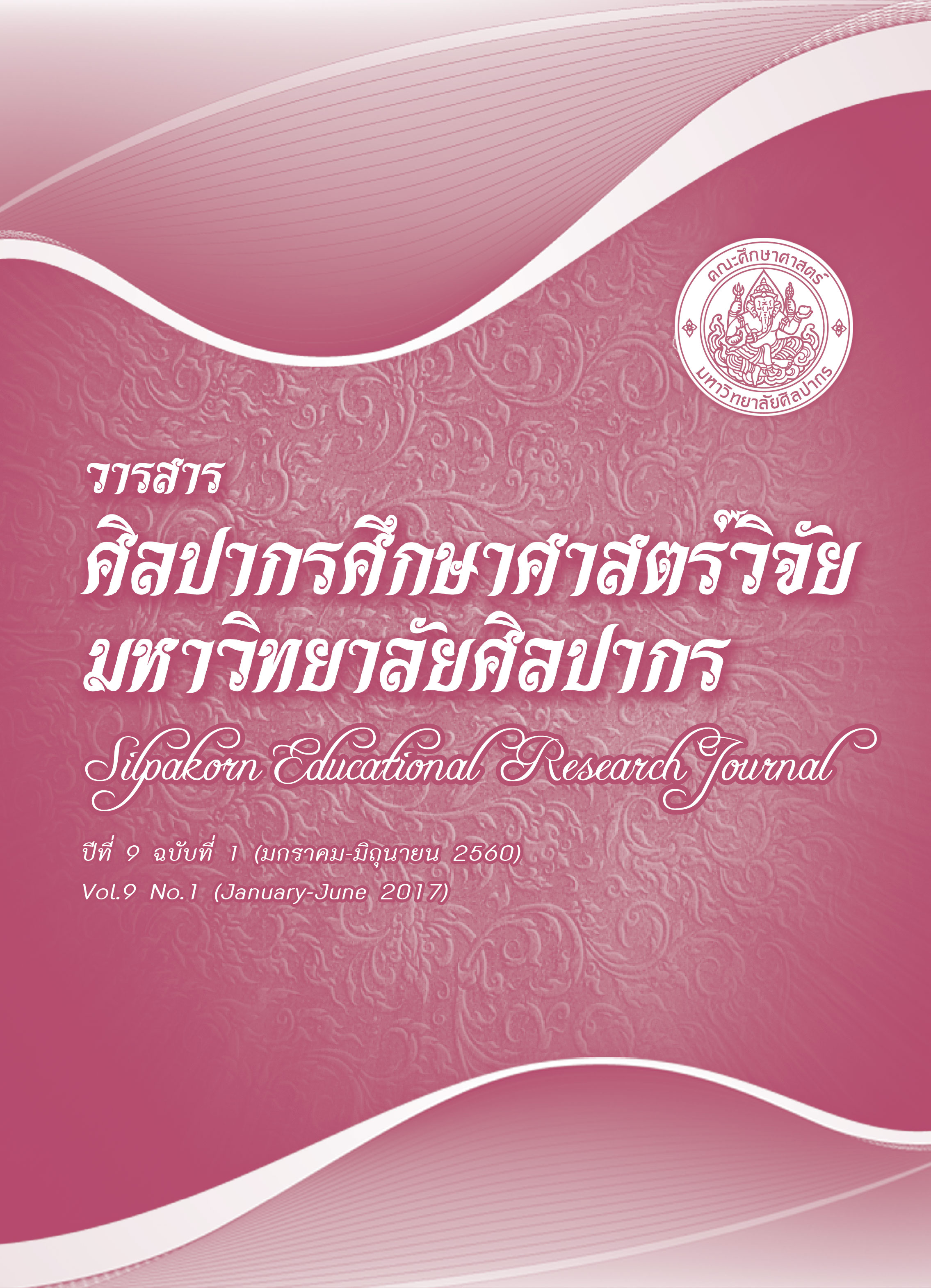รูปแบบการโค้ชทางปัญญาแบบเพื่อนช่วยเพื่อนเพื่อพัฒนาสมรรถนะการจัดการเรียนการสอนของครู ที่ส่งเสริม Metacognition ของนักเรียนในโรงเรียนสังกัดกรุงเทพมหานคร (Cognitive Peer Coaching Model for Promoting Instructional Competency)
คำสำคัญ:
Keywords, Coaching Model / cognitive peer coaching model / Metacognitionบทคัดย่อ
รูปแบบการโค้ชทางปัญญาแบบเพื่อนช่วยเพื่อนเพื่อพัฒนาสมรรถนะการจัดการเรียนการสอนของครู
ที่ส่งเสริม Metacognition ของนักเรียนในโรงเรียนสังกัดกรุงเทพมหานคร
Cognitive Peer Coaching Model for Promoting Instructional Competency of Teacher to Enhance Metacognition
of Students in Bangkok Metropolitan Administration
บทคัดย่อ
การวิจัยครั้งนี้มีวัตถุประสงค์เพื่อ 1) พัฒนารูปแบบการโค้ชทางปัญญาแบบเพื่อนช่วยเพื่อนฯ และ 2) ศึกษาประสิทธิผลของรูปแบบการโค้ชทางปัญญาแบบเพื่อนช่วยเพื่อนฯ ที่พัฒนาขึ้น กลุ่มตัวอย่าง ประกอบด้วย ครู 6 คน และนักเรียน 168 คน ซึ่งผลการวิจัย พบว่า
1. การพัฒนารูปแบบการโค้ชทางปัญญาแบบเพื่อนช่วยเพื่อนฯ มีชื่อว่า PCCEC Model ซึ่งผ่านการตรวจสอบความเหมาะสมและความสอดคล้องจากผู้เชี่ยวชาญทุกองค์ประกอบ PCCEC Model มีองค์ประกอบ 3 ส่วน ได้แก่ 1) หลักการและวัตถุประสงค์ 2) กระบวนการ และ 3) เงื่อนไขการนำรูปแบบไปใช้ โดยมีกระบวนการโค้ช 5 ระยะ ได้แก่ การเตรียมการโค้ช (Preparing : P) การวางแผนการปฏิบัติ (Creating Action Plan : C) การปฏิบัติการโค้ช (Coaching : C) การร่วมกันประเมินผลความสำเร็จและประมวลผลความรู้ (Evaluating of Intended Outcomes and Conceptualizing of Knowledge : E) และการพัฒนาวิชาชีพอย่างต่อเนื่อง (Continuing Professional Development : C)
2. ประสิทธิผลของรูปแบบการโค้ชทางปัญญาแบบเพื่อนช่วยเพื่อนฯ พบว่า 1) สมรรถนะการจัดการเรียนการสอนที่ส่งเสริม Metacognition ของผู้รับการโค้ชหลังสูงกว่าก่อนการทดลอง 2) ผลการเรียนรู้และทักษะ Metacognition ของนักเรียนหลังสูงกว่าก่อนการทดลอง 3) ความคิดเห็นของนักเรียนที่มีต่อการจัดการเรียนการสอนของผู้รับการโค้ชอยู่ในระดับมากที่สุดทุกข้อ และ 4) ความคิดเห็นของผู้ทำหน้าที่โค้ช และศึกษานิเทศก์ที่มีต่อการนำ PCCEC Model ไปใช้ อยู่ในระดับมากถึงมากที่สุด
คำสำคัญ: รูปแบบการโค้ช / การโค้ชทางปัญญาแบบเพื่อนช่วยเพื่อน / Metacognition
Abstract
The purposes of this research were 1) to develop a cognitive peer coaching model and 2) to examine evidentially effectiveness of the model. The sample were 6 teachers and 168 students. The research results were as follows:
1. The cognitive peer coaching model design and development called “The PCCEC Model” which consisted of 3 components: 1) principle and objective component 2) process component and 3) model implementation condition component. The procedure could be divided into 5 phases: phase 1: Preparing : P, phase 2: Creating Action Plan : C, phase 3: Coaching : C, phase 4: Evaluating of Intended Outcomes and Conceptualizing of Knowledge : E and phase 5: Continuing Professional Development : C.
2. The resaults of PCCEC Model implementation revealed that 1) coachee’s competency of instructional enhancing metacognition after were higher than before, 2) students’ knowledge and metacognition after were higher than before, 3) The student agreed that coachee’s teaching the best every items, and 4) The coacher and supervisor agreed that PCCEC model implementation at higher and highest level.
Keywords: Coaching Model / cognitive peer coaching model / Metacognition





